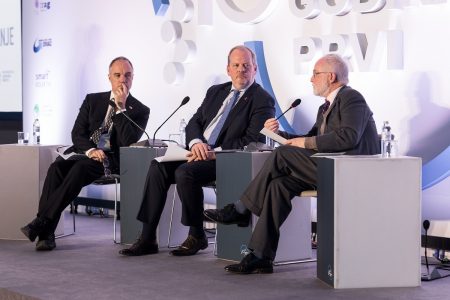At an international conference on amendments to the Constitution, the Dutch Ambassador to Serbia, H.E. Mr Hendrik van den Dool said that, during his four-year mandate in Serbia, he became more cautious, and realized that the strategies, action plans and laws themselves do not guarantee anything.

“To illustrate this – by adopting the law which stipulates that trains are allowed to travel at a speed of 200 kilometres per hour does not necessarily mean that the trains will move at that speed,” said Hendrik van den Dool at the conference titled “Changing the Constitution on the Road to the EU: How are proposed amendments going to benefit the judiciary?”
He pointed out that one of the main goals, in addition to harmonizing the Constitution of Serbia with European standards, was to provide conditions for an independent judiciary.
“A politically controlled judiciary is a major obstacle to democracy, economic development and stability. Independent judiciary is a fundamental value that belongs in Serbia as much as in the Netherlands. We want to raise the awareness of the Serbian citizens about this,” he said.
The Netherlands Ambassador assessed that the discussion was important, but that it was more important to discuss in the Parliament and other places than Belgrade.
Medjak: The problem is that the debate did not take place on national TV
Vice President of the European Movement in Serbia, Vladimir Medjak, said that the biggest problem of the debate was that it was never held on national television, adding that one of the conditions for complying with the transitional criteria for EU membership is that there an inclusive public debate should be held on the topic.
Medak said that on June 14th, the Serbian Parliament initiated the process of amending the Constitution at the Government, after almost six months.
“However, and regardless of our talks on the topic so far, certain practical questions have now been opened. We learned that the government was not authorized to propose amendments, so this raises the question of why the government conducted a public debate, and why did it send the text to the Venice Commission when the Serbian Parliament won’t be able to see it,” Medjak said.
He added that by initiating the issue of amending the Constitution of Serbia, the relevant procedure was returned to the level stipulated in the Action Plan for the implementation of Chapter 23 from the beginning of 2016.
“The Action Plan stipulates that it is the Parliament that initiates the process of drafting the Constitution and this had to be done by late 2015 or early 2016, so that, by the end of 2017, we would have had a Constitution. Now is June 2019 and we have regressed to early 2016,” he warned.
AUTOR: Beta, N1